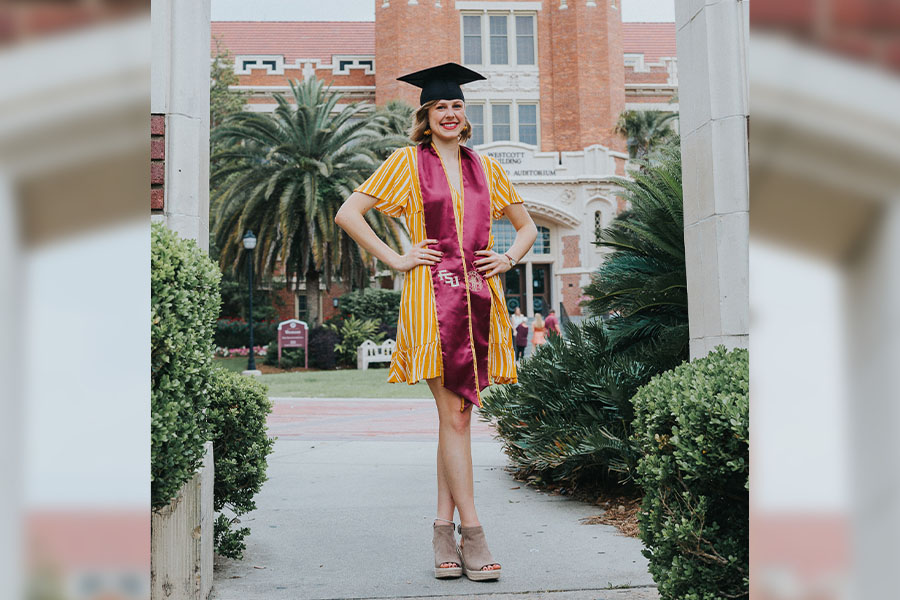Alumni Spotlight: Katie Shapiro

Katie Shapiro graduated from the Department of History, part of the College of Arts and Sciences, in the spring of 2020 with honors in the major. She also majored in international affairs and minored in social work, both part of the College of Social Sciences and Public Policy.
Where are you from, what did you study, and when did you graduate?
I’m originally from Lakeland, Fla. I studied history and international affairs and minored in social work. My primary area of focus was 20th century history and policy surrounding human rights. I’m a newly minted FSU alumna from the Class of 2020!
What brought you to FSU?
In high school, I wasn’t sure about attending college until our band attended Band Day with the Marching Chiefs. After visiting FSU’s campus, I knew I wanted to play the tuba for the Marching Chiefs. I also discovered FSU offers a strong liberal arts program and has amazing, intriguing study abroad opportunities.
What inspired you to major in history? What do you find most interesting about your area of research?
I chose history because it was my favorite subject throughout elementary, middle and high school. The study of history is important in order to understand present situations, to develop potential solutions, and to gain a deeper understanding of humanity. History is one long story with countless characters and perspectives; it’s both macro and micro, and the humanity that exists within these stories is what I love.
I’m most fascinated by history’s ability to challenge me to see events from new perspectives and explore different worldviews. For my honors thesis, I studied sterilizations of Native American women in the 1970s. I focused on American Indian women activists, their artwork, their perspective on the events, their definitions and viewpoints on human rights and their overall historical impacts. I was challenged to think critically about definitions and assumptions we hold regarding human rights violations and where and how they happen.
How did you become involved in human rights work and refugee services? How has your history major influenced your work in that area?
I first became involved with human rights work and refugee services by taking professor of ethnomusicology Frank Gunderson’s music and international human rights course. It pushed me to research human rights while studying abroad in Prague during Summer 2018 and to volunteer for the Center for the Advancement of Human Rights. I took more classes on refugee protection and history and became involved with an organization called Darasa, a program started by FSU students to support refugee and migrant families in Tallahassee. This led me to serve the International Rescue Committee in Tallahassee as an intern case worker.
These experiences taught me how personal human rights are. In the Prague program, we were taught to individualize human rights. It’s easy to see numbers and statistics in history, but when we take a step back to see faces, names, and stories attached to these numbers, we truly understand these statistics. Studying history helped me discover these stories and humanize human rights. History teaches you causes of events and surrounding perspectives. This knowledge kindles a greater understanding of an event and fosters a space to create solutions. Studying history doesn’t have to be relegated to archives or libraries; the skills you learn, such as critical thinking, problem solving and creativity, lay a wonderful foundation for human rights work.
Are there any faculty/staff who have helped or inspired you?
There are many faculty and staff that shaped my experience at FSU; the entire staff at CAHR inspired me daily. My instructors in Prague gave me the foundation to pursue this path: Professor of international affairs Whitney Bendeck, the College of Social Work’s doctoral program director and associate director of the Institute for Justice Research & Development Stephen Tripodi, and our tour guide Eva Illnoreva. Professor of history Andrew Frank advised my honors thesis. Director of International Programs Neil Abell’s international social welfare class gave me a new perspective on social work and human rights. Professors of music David Plack, Patrick Dunnigan, and the grad students who lead the Marching Chiefs formed my first family at FSU.
How were you able to maintain your research and commitment to academic success during the COVID-19 pandemic?
I tried to maintain a regular schedule and a sense of normalcy. I was an intern with the IRC at this spring, so sticking to a work schedule was a blessing. It also helped that my FSU instructors were supportive and encouraging.
What are your plans now that you have graduated with you bachelor’s degree?
After graduation, I moved to Washington D.C. with my sister and recently started as a Reception and Placement Case Manager with the Ethiopian Community Development Council, one of nine resettlement agencies in the U.S. In the future, I plan to pursue a master’s degree in social work with an emphasis on nonprofit leadership and macro policy. I hope to create educational and social support programs for refugee and migrant students.
Although you might miss FSU, what are you looking forward to in your post-graduate life?
I’m excited to get involved with the community here in D.C. I signed up for a book of the month club, and while I saved many textbooks to reread, I’m pumped to read solely for the enjoyment of reading!
What do you like to do when you’re not doing schoolwork or research?
In addition to reading fun books, I like to exercise and go on outdoor adventures, watch “Bob’s Burgers” and listen to music.
What advice do you have for fellow students?
You never know when something might spark a passion. Your degree is what you make of it, so shape it into something you love! Take every opportunity to learn more about the world around you and the people in it.
